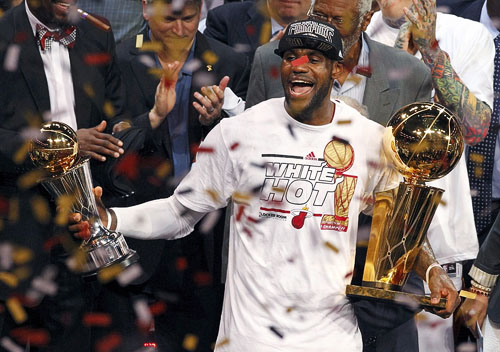
Kawhi Leonard catches the inbounds pass with 20 seconds remaining in Game 6 of the NBA Finals and is fouled. He’s 21 years old and in his second season as a professional. The rangy swingman out of San Diego State has found a home with the San Antonio Spurs, coming into his own on a team that knows just what to do with his particular skill set. The Spurs have won four championships since Tim Duncan arrived in 1997; they have done so partly because Duncan is on the roster and mostly because head coach Gregg Popovich has spent the last 15 years collecting pieces like Leonard and figuring out exactly how they fit together to offer the best possible chance at success.
Leonard is a versatile slasher and streaky long-range threat, with quick hands and tremendous defensive instincts. He has been a starter throughout the playoffs and has become a reliable scoring option for the Spurs, developing his inside-outside game on the fly to fill whatever role his team needs most on its way to the franchise’s first trip to the championship round since 2007. Leonard has been tasked in the finals with guarding LeBron James—the best player of the last two decades—a service that he has performed capably and without reservation. His team is ahead three games to two over the defending champs and has a two-point lead on Miami’s home court when he is swatted by Mike Miller and sent to the line for a pair of free throws.
A four-point lead would all but seal the championship for San Antonio, finishing off one of the more remarkable upsets in recent finals history, an upset that seemed less like an upset as the series went
on and one that could not have happened without Leonard. He settles in, breathes deeply, exhales, taking his time, bending his knees, rocking in place, staying loose as he sizes up his first attempt. He finally lets the shot go and it looks good right up until the point when it rattles out of the rim to a howl of approval from the crowd at American Airlines Arena.
If Leonard’s internal organs have begun to liquefy he doesn’t show it. He just stares straight ahead like always, giving nothing away, glances around at his teammates, receives the ball for his second attempt and takes less time thinking before he sinks it. Spurs by three, but that’s as close as they would get. What happened next was the rest of what was immediately (and rightly) identified as one of the greatest games ever played in the NBA—LeBron’s missed three, Chris Bosh’s offensive rebound, Ray Allen’s three from the corner that looked good all the way through and stayed that way. Overtime. Spurs by one. Heat by one. Heat by three. Game.
The series wasn’t decided yet, but it sure felt like it was.The Spurs went back to the arena two days later, and they led Game 7 for stretches, and they had their chances, and their shooters went cold, and the turnovers piled up, and LeBron remembered that he was LeBron, and the Heat won their second straight NBA title 95-88. It was a fitting end to Miami’s season, one in which they reeled off a 27-game winning streak and finished with the NBA’s best record, one in which LeBron posted a stat line for the ages to become the most sensible unanimous MVP pick in history for anyone not writing for The Boston Globe. The Heat got the title they were supposed to get, and LeBron came through when Miami needed him, and the better team won. Simple—unless, of course, you watched it, because the better team also lost. It’s rare, but it happens now and then. It happened this year. Hell of a show.

